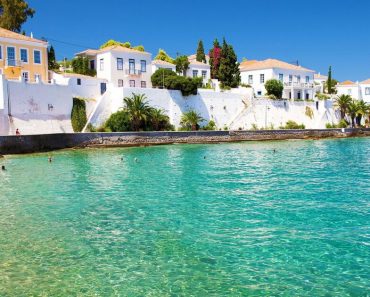
By Andrew Catchpole
Published: 24 January, 2025
Has Greece reached a tipping point in the UK? Certainly, the many producers at Maltby&Greek’s annual showcase tasting in London were hopeful that this is the case, with the hard graft and shoe leather that both they and their importer have put in over the last decade now seemingly paying off.
Sales of wines at this pre-eminent Greek importer are up by over 20% year on year, which is all the more impressive given the moribund state of the overall wine market. It suggests that Greek wines have firmly arrived and continue to make inroads with sommeliers and independent merchants.
“It’s changed completely since we started 10-12 years ago, when people recoiled at sight of a Greek tasting – ‘oh no, not Retsina’,” says Maltby&Greek’s co-founder Stefanos Kokotos, speaking amid the hubbub of this popular tasting.
“It’s taken many years, a lot of events, a lot of door-to-door sales with the producers in our range. And what we’ve seen in the past three-to-four years is a complete sea change, in terms or acceptance of Greek wines and appetite for Greek wines.”
Intriguingly, though, despite the huge numbers of British tourist that visit Greece and its archipelago each year, Kokotos adds that the UK is in fact behind other major export markets, such as the US, when it comes to uptake of Greek wines. This, however, is fast changing, and not least because of the investment that Greek regions and government have also made in this market over the past few years, with significant tastings for the trade.
The catalyst, says Kokotos, has been multifaceted, combining evolving tastes in the UK, which better align with the styles and varietal individuality coming out of Greece, plus an overall and ongoing rise in the quality and range of wines now being shipped to the UK.
Business partner Yannos Hadjiioannou adds: “Also the quality of the restaurants in the UK has improved, we see efforts by non-Greeks doing Greek-themed restaurants, they have the knowhow and are approaching it with a fresh eye, really putting in a lot of effort.
“And Greek food and Greek wine goes hand in hand; they are investing in somms, and their staff, investing in knowledge, and those portfolio tastings make a big difference as well.”
As Harpers can confirm from scouring top UK restaurants’ lists as part of the judging for our 50 Top Sommeliers, Greece has evolved beyond a ‘tick box’ Santorini Assyrtiko listing to become a category at many establishments, with a selection offered of both whites and reds.
A question remains, though, as to whether the country can now breakthrough into the wider market, or will necessarily remain a niche, quality proposition, folding in the types of smaller production wines that Maltby&Greek excels at sourcing.
“The [wine] professionals are educating customers; go to restaurants these days and now you often see Greek wine, people will hand hold you, so that first leap of faith is happening a bit more often and a bit more naturally,” says Kokotos.
However, he identifies a gap in the middle ground that needs filling: “In supermarkets, when you get an Assyrtiko at £8.99, it opens it up [to more people], but then when you go in to indie off-trade, and the next available Assyrtiko is £28, would you buy that?”
One catch – if it is such – is that with Greece it’s not easy to find good entry level wines, not least because of the topography of this rugged country, which lends itself to smaller scale, more artisanal, and thus necessarily quality-focused production.
“There are a handful of bigger producers than can meet demand, but not many,” says Hadjiioannou.
“We visited one recently, and they showed us a tractor – the first we’d seen in Greece! This is a country that can’t mechanise to that degree and industrialise production of wine, it’s all mountainous, very small plots, and similar to Burgundy, with lot of fragmented ownership of plots.”
Hadjiioannou adds that “mass production in Greece is still very small”, with the average size of a producer being around 60,000 bottles (obviously with many smaller, offset by the handful of bigger operations). And feeding into this smaller-scale scene are a lot of new winemakers and wineries coming online, with a younger generation jumping aboard, again feeding into the excitement and individuality that is driving interest in Greece.
Willy Lebus, consultant to Maltby&Greek, was at the tasting and elaborated further on how this shift is underpinning Greece’s appeal.
“One of the reasons why Greece has really come to life is it has acidity, lowish alcohol, indigenous varieties and the other thing it’s got is new, young winemakers, who are really enthusiastic about experimenting – but they are also European, so they don’t go crazy,” he enthuses.
“People are realising there’s more to life than Santorini Assyrtiko, good though it is. It’s a brilliant variety, and when it’s grown on the islands, in the Peloponnese, or at high altitude, ‘whoop!’ – and the acidity really shines. Talk to younger generations of drinkers, and they really want that acidity, they want more subtlety, less oak, freshness… and Greece offers that.”
All of this and more is apparent across the Maltby&Greek portfolio, with producers such as Magoutes Vineyards, Alpha Estate, Acheon Winery and Rouvalis Winery among the many showing gently crafted, elegant wines from myriad varieties (including revived, very rare grapes), ranged across endless highland and island terrains.
A final word goes to Theodora Rouvalis (pictured), oenologist at Rouvalis Winery, who presides over vineyards at 800-1,100 metres altitude in the Peloponnese, also being a member of CERVIN, the Italian-based organisation dedicated to protecting ‘heroic’ mountain viticulture. Amphoras and long skin contact whites are part of the deal here on these very accomplished wines.
“There are a lot of vineyards, a lot of potential, microclimates and sites – Greece anyway is focused on quality, we cannot do quantity, so there is a big potential,” says Rouvalis.
“For us it’s important not just that the viticulture is done here, not just that it is heroic, it’s that the product is more special, and outside of the mass modern production.
“We have special conditions, all over Greece, and the main problem is that today many of these areas are abandoned, so this is difficult, we need people to come back to the land, the government needs to have a plan, focusing on reviving the mountain areas,” she concludes.
Whether or not such an initiative will ever be undertaken remains to be seen. But young Greek winemakers appear to be making it happen under their own steam, and the more the wine drinking public engages with such wines, the more likely it is that this virtuous circle will continue, much to the benefit of Greek wines and their drinkers.






